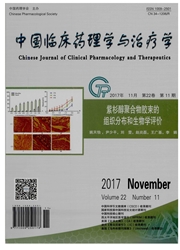

 中文摘要:
中文摘要:
目的探讨S1RTl基因多态性与肺癌对以铂类为基础的化疗敏感性的关系。方法选取338名肺癌患者(其中184名对化疗耐药和154名对化疗敏感)为研究对象,所有患者均接受以铂类(顺铂、卡铂)为基础的化疗。分析其SIRTl的所有单核苷酸多态性,最后筛选出4个tagSNPs进行基因分型。OR和CI用来评估SIRTl基因多态性与肺癌患者化疗效果的相关性。结果在〉60岁的肺癌患者中,rs3758391的基因多态性与铂类化疗疗效显著相关(OR=0.38,P=0.049)。rs3740051、rsl2778366的遗传多态性与铂类化疗疗效之间无显著相关性。结论SIRTlrs3758391基因多态性可以显著影响肺癌患者铂类化疗的敏感性,SIRTl可能作为肺癌铂类化疗疗效评估的标志物。
 英文摘要:
英文摘要:
Objective To explore the relationship between the SIRT1 genetic polymorphisms and chemosensitivity to plati- num-based chemotherapy in lung cancer patients. Methods A total of 338 lung cancer patients (184 resistant and 154 sensitive) were selected and treated by platinum-based chemotherapy in this study. All single nucleotide polymorphisms in SIRT1 gene were analyzed and four tagging SNPs were finally screened for genotyped. The odds ratios (OIL) with 95 % confidence intervals (CI) were used to assess the effect of S1RT1 Genes Polymorphisms on the chemosensitivity of patients with lung cancer. Results We found a significant association of SIRT1 rs3758391 polymorphism with platinum-based chemotherapy effectiveness in lung cancer patients who were older than 60 years (OR=0.38, P = 0.049). While no significant correlation was discovered between rs3740051, rs12778366 genetic polymorphism and platinum-based chemotherapy effect . Conclusion Our findings suggest that the SIRT1 rs3758391 genetic polymorphism can affect platinum-based chemotherapy sensitivity in lung cancer patients, and SIRT1 may be act as a potential biomarker on lung cancer chemotherapy response.
 同期刊论文项目
同期刊论文项目
 同项目期刊论文
同项目期刊论文
 Meta-analysis on pharmacogenetics of platinum-based chemotherapy in Non Small Cell Lung Cancer (NSCL
Meta-analysis on pharmacogenetics of platinum-based chemotherapy in Non Small Cell Lung Cancer (NSCL The A/G allele of eIF3a rs3740556 predicts platinum-based chemotherapy resistance in lung cancer pat
The A/G allele of eIF3a rs3740556 predicts platinum-based chemotherapy resistance in lung cancer pat Genetic polymorphism of copper transporter protein 1 is related to platinum resistance in Chinese no
Genetic polymorphism of copper transporter protein 1 is related to platinum resistance in Chinese no Association of Wnt-Inducible Signaling Pathway Protein 1 Genetic Polymorphisms With Lung Cancer Susc
Association of Wnt-Inducible Signaling Pathway Protein 1 Genetic Polymorphisms With Lung Cancer Susc Prediction of copper transport protein 1 (CTR1) genotype on severe cisplatin induced toxicity in non
Prediction of copper transport protein 1 (CTR1) genotype on severe cisplatin induced toxicity in non The ATP7B genetic polymorphisms predict clinical outcome to platinum-based chemotherapy in lung canc
The ATP7B genetic polymorphisms predict clinical outcome to platinum-based chemotherapy in lung canc 期刊信息
期刊信息
